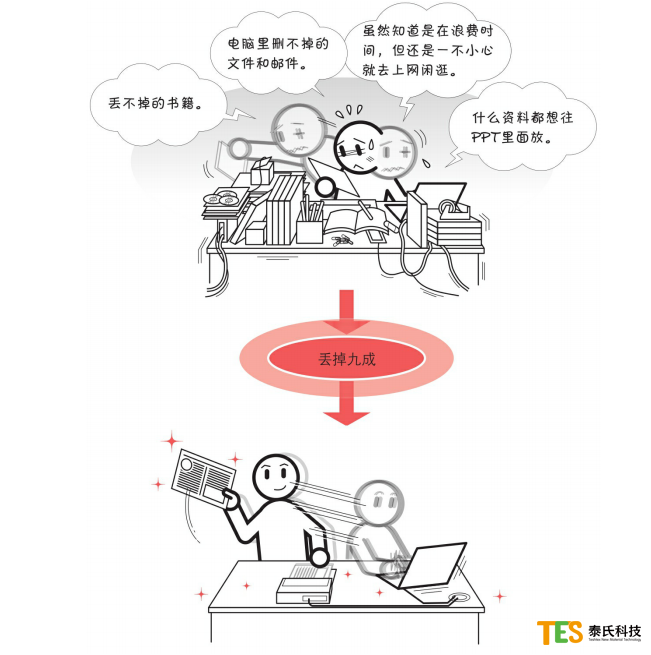|
●二流人士通过做加法思考,一流人士通过做减法思考
“大家为什么做不了减法?”某位著名经营者说。
“虽然做得了加法,却做不了减法。”这个道理从企业到个人普遍适用。
酒、烟、依赖网络等,虽然知道停止了就好,可是大部分时候还是做不了“减法”。为什么会这样?
人类的历史就是同饥饿战斗的历史。为了不饿着肚子,能吃的时候就多吃,能弄到手的东西就尽可能弄到手,因此人体自然地养成了做加法的习惯。
只会做加法的人被迫做减法是在这短短10年到20年间发生的事情。
食物方面,也从只要制造出商品就能销出去的时代,转变为吃得饱,物质充裕的时代。于是,我们被迫开始做减法。
所谓减法,就是除去不需要的东西,也就是“丢弃”。
“丢不掉的书籍。”
“电脑中删不掉的文件和邮件。”
“虽然知道是在浪费时间,但还是一不小心就去上网闲逛了。”
我们总是被这样一堆丢不掉的东西包围。
不单是在工作上,个人生活的方方面面也是这样的。衣服、书籍、小物品等,虽然你想扔掉,却发现大部分的东西扔不掉。另一方面,新的东西又不断地在增加。
企业也被逼到生死存亡的关键时期,无法丢弃收益性较低的事业。
放置不管的话,我们总是不知不觉又做起了加法。
●乔布斯的“丢弃九成”
请你想象一下,现在你在自己的房间里,你面前有100本书。你需
要把其中不需要的书籍丢掉。
如果是你的话,你会采取怎样的方法来丢弃呢?
把每本书拿在手里,一本一本地判断后,将其分为“需要”和“不需要”两类,对吧?这样一来岂不是要花费大把的时间?
工作中,你是不是也用这样耗费时间的方法在做事情?这样一来,你的工作怎么能提高效率呢?
首先,重要的是要制作出明确的“丢弃标准”。
“乔布斯的做法与其他人不同的地方在于,他不是去探寻最重要的决定是什么,而是相信最重要的决定是决定不去做什么。”约翰·斯卡利如是说。
乔布斯通过“丢弃九成”这个说法表现出了这种思维方式。
丢弃的标准越明确就越能够毫不犹豫地丢弃,这也重要,那也重要,这样一想,丢不掉的东西,也能干脆爽快地丢掉了。
爽快地丢掉“不需要做的工作”

POINT
决定了“不做什么”,就能提升工作的速度和质量。
● Second-rate people think through addition, first-class people think through subtraction
"Why can't everyone do the subtraction?" said a famous operator.
"Although you can do addition, you can't do subtraction." This principle applies from enterprise to individual.
Alcohol, tobacco, dependence on the Internet, etc., although it is known to stop, but most of the time can not do "subtraction." Why is this happening?
The history of mankind is the history of fighting hunger. In order not to be hungry, you can eat more when you can eat, and you can get the hand as much as you can, so the body naturally develops the habit of adding.
Those who only do additions are forced to do subtraction in what happened in just 10 to 20 years.
In terms of food, it has also changed from an era in which it can be sold as long as it is manufactured, to an era of full food and abundant material. So we were forced to start doing subtraction.
The so-called subtraction is to remove unnecessary things, that is, "discard."
"Books that can't be lost."
"Files and emails that cannot be deleted from the computer."
"Although I know I was wasting my time, I still went online and strolled around."
We are always surrounded by such a pile of things that cannot be lost.
Not only in work, but also in all aspects of personal life. Clothes, books, small items, etc., although you want to throw away, you find that most of the things can not be thrown away. On the other hand, new things are constantly increasing.
Enterprises are also forced to go to a critical period of survival, and they cannot discard a less profitable business.
Regardless of the placement, we always do the unknowingly and add.
● Jobs's "discard 90%"
Please imagine that now you are in your own room, there are 100 books in front of you. you need
I want to throw away the books that are not needed.
If it is you, what method would you take to discard it?
Put each book in your hand, after a local judgment, divide it into "needs" and "not needed", right? Doesn't it take a lot of time to do this?
At work, are you also doing things in such a time-consuming way? In this way, how can your work improve efficiency?
First of all, it is important to make a clear "discard standard."
"The difference between Jobs's approach and others is that he is not looking for the most important decisions, but believes that the most important decision is to decide not to do anything," John Sculley said.
Steve Jobs showed this way of thinking by saying "discarding 90%."
The more clearly the discarding standard is, the more it can be discarded without hesitation. This is also important. It is also important. In this way, things that cannot be lost can be simply thrown away.
Quickly throw away "work that you don't need to do"
Lost 90%
POINT
Deciding "do nothing" can improve the speed and quality of work.
(责任编辑:泰氏科技) |













